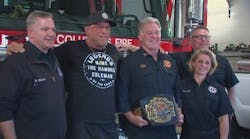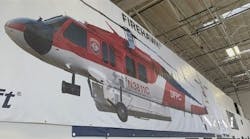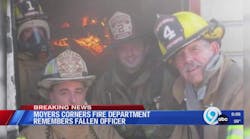Now, 32 years later, I know what that firefighter meant about being a "grownup."
It would be an understatement to say that the last 11 months have been very entertaining, if not at times interesting. There are a tremendous number of moving parts that go into running a city government that provides services to 60,000 citizens.
Along with the daunting task of the position, I have experienced some sort of newfound notoriety as a fire chief turned city manager. For example, a lot of my friends have asked to put my name (I think it was just for the title) on their resumes when hunting fire chief positions. Some have even asked me to send letters of recommendation to their prospective city managers. (One "good ol' boy" to another, I guess?) I think that they are all hoping that the reviewing city manager will not figure out that I am really a wolf in a cheap sheepskin suit. The most recent episode of this weird behavior occurred when our Editor-in-Chief, Harvey Eisner, asked me to write a series of columns describing how a city manager views the fire-rescue department and to give readers insight into what makes the governmental chief operating officer tick. Not wanting to let down a very longtime friend and colleague, here is my next series of columns, Messages from the "Dark Side."
The first bit of advice that I would share with the fire chief would be to "walk a mile" in the city manager's shoes. Sounds simple enough. But, let's take a little closer look at the job responsibilities that Mr. or Ms. "CM" typically handles on a day-to-day basis. To use our city (Dothan, AL) as an example, there are 13 separate operational departments that are equally important to the health, welfare, prosperity and convenience of the citizens we are privileged to serve. Couple that looming statistic with the fact that there are seven elected officials (the city manager's bosses) in our governing body, and one quickly appreciates just how fast paced life is, or should be, for the city manager.
Just like all chief fire officers, city managers are going to have excellent staff members working for them. Some of the key players who have tremendous decision-making input are the city attorney and the finance and personnel directors. These players are required for successful day-to-day organizational operations. Also, like most leadership folks, there are always a few confidants, based on trust and personal relationships, to add to the list of those I have already mentioned.
Knowing that the city manager is the person who distributes the resources (operating and discretionary dollars) to all departments, the fire chief needs to be on the "A" team. Most fire chiefs I know are uncomfortable, at best, around the city manager or even the City Hall complex. I would suggest that the practice of being "out of sight, out of mind" costs the fire-rescue department dearly. The fire chief does not need to be the city manager's best friend, but there are advantages to having a professional and mutually supportive relationship. The days of hugging the coffee pot and hoping for the "Big One" are over for the modern-day fire chief- or at least they should be.
Make it a point to be useful and well known at City Hall. For example, volunteer to work on citywide and community-based projects. At a minimum, make sure your senior officers serve on various committees and work groups at the citywide level. Don't shy away from establishing and maintaining a meaningful dialogue with your city manager. If you show up only for required staff meetings and "peel tires" out of the downtown parking lot afterwards (because you hate the "ivory tower" syndrome), most likely you will not get your fair share of the resources. Furthermore, you might not be included in splitting the "extra piece of pie" whenever that happens to occur in your city.
There you have the first big inside look into what goes on in the corner office. Recognize that we, the fire-rescue service, are only one important part of the many important parts of a city government. Don't be a stranger to your boss. You owe it to your members to play in the "big sandbox."
I hope that this series makes sense and you find it helpful in managing "upwards" or simply figuring out your boss. Please let us know your thoughts about this series through the normal feedback media (letters, e-mails, telephone calls and the like).
Dennis L. Rubin, a Firehouse® contributing editor, is the city manager and public safety director for the City of Dothan, AL. He is a 30-year fire-rescue veteran, serving in many capacities and with several departments. Rubin holds an associate's degree in fire science from Northern Virginia Community College and a bachelor's degree in fire science from the University of Maryland, and he is enrolled in the Oklahoma State University Graduate School Fire Administration Program. Rubin is a 1993 graduate of the National Fire Academy's Executive Fire Officer Program and holds the national Certified Emergency Manager (CEM) certification and the Chief Fire Officer Designation (CFOD) from the International Association of Fire Chiefs (IAFC). He serves on several IAFC committees, including a two-year term as the Health and Safety Committee chair. Rubin can be reached at [email protected].




